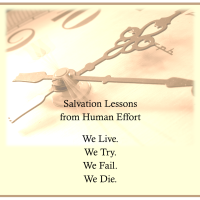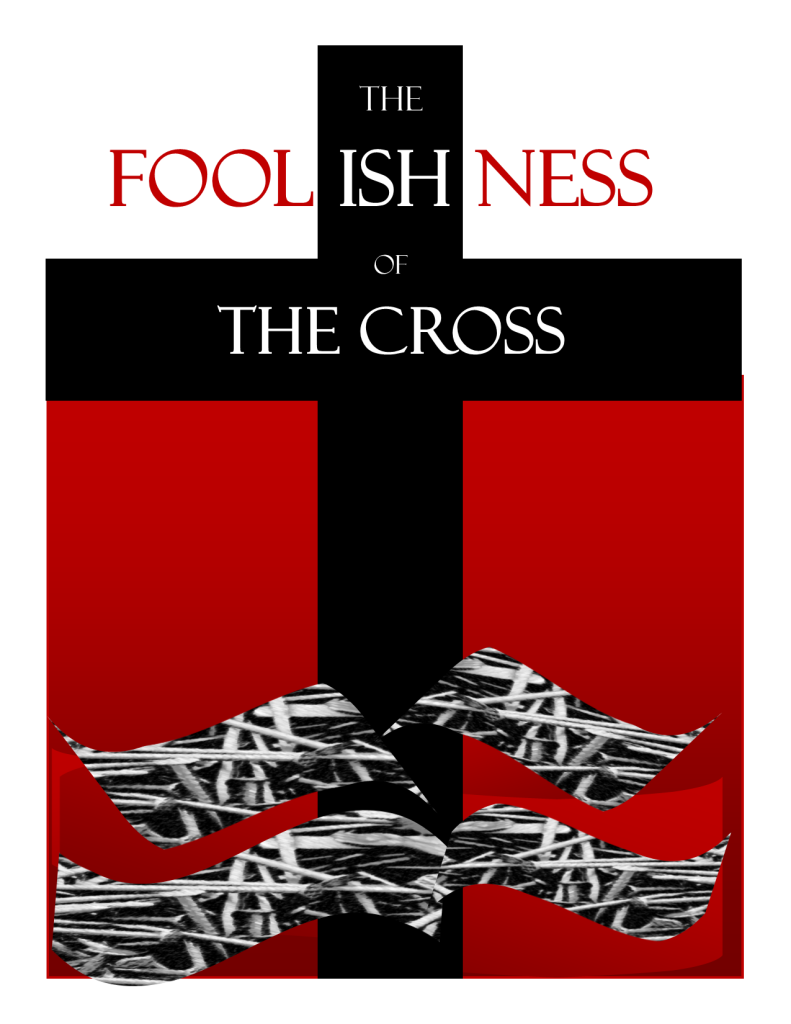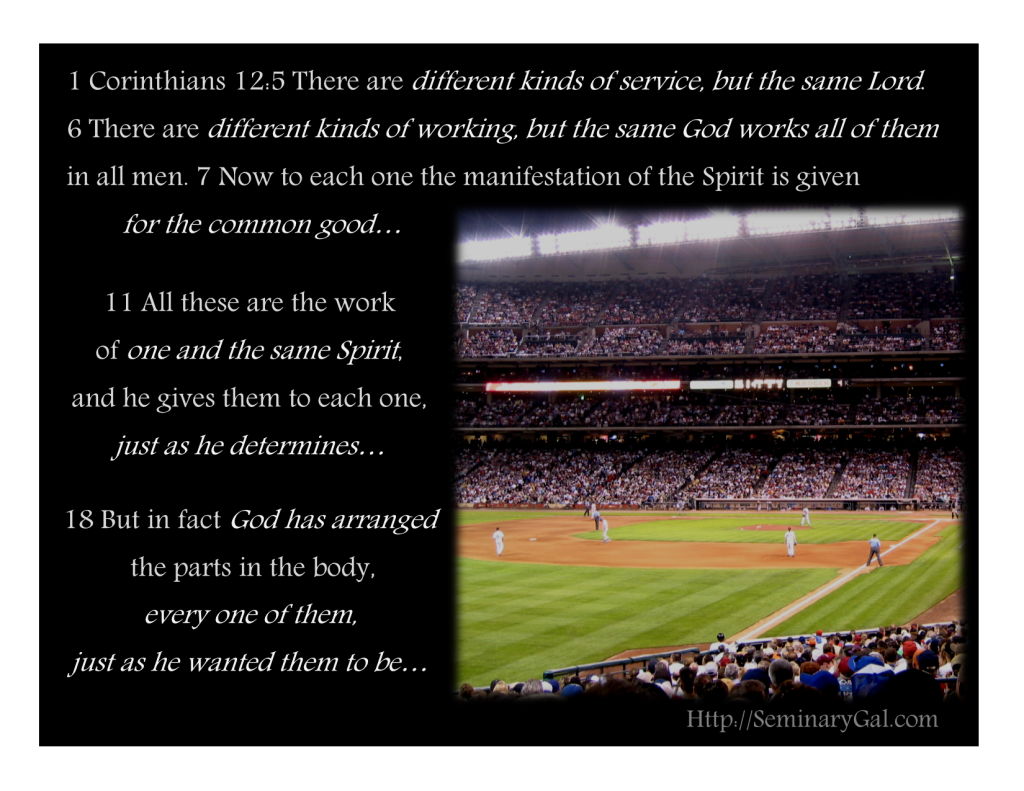The Foolishness of the Cross
(A message preached by Barbara Shafer at Advocate Condell on 2/2/2014)
Have you ever had the experience of not knowing how much you don’t know until you learn something and realize that what you thought you knew, you didn’t really know at all?

Or the experience of preparing to teach and finding that you’re teaching yourself new things about the topic in the nick of time to be able to teach others? Or how about that feeling when you find yourself in a room of people who all understand exactly what’s going on and you don’t even understand their vocabulary?
That happened to me in my first systematic theology class. I thought that by reading my Bible and going to Bible studies, I’d have a really good idea of what it was all about. Then people with whom I was a student-peer started talking about infralapsarianism, supralapsarianism, and sublapsarianism. Uh-oh. Then others threw around the notions of pre-tribulation, post-tribulation and mid-tribulation raptures and I thought to myself, “Gee, I don’t pretend to know exactly when it happens—and it doesn’t make any difference to me as long as I’m raptured and not left behind!” But the big theology words that people threw around the most were justification and sanctification.
I suddenly realized that the world was filled with very smart people and I wasn’t one of them.
Silly me. I thought I understood enough. I knew that I was a sinner and Christ died for me. And I repented. (Pssst. That is enough)
I came to learn, surrounded by very smart people, that it’s not so much what you know in your head, it’s WHO you know in your heart that counts. To be sure, there were many smart people in seminary who knew a lot and who knew Jesus as well, but I didn’t need to feel bad that I wasn’t as smart as they.
Smart people aren’t limited to seminary. Many of them are in institutions of higher learning. Because they’re smart. In narrating an episode of the Discovery Channel’s series Curiosity Steven Hawking stated:
“We are each free to believe what we want and it is my view that the simplest explanation is there is no God. No one created the universe and no one directs our fate. This leads me to a profound realization. There is probably no heaven, and no afterlife either. We have this one life to appreciate the grand design of the universe, and for that, I am extremely grateful.”
Hmmm. Simplest explanation is there is no God. Really? Yes, there are a lot of smart people in this world who don’t know God. They don’t really like God at all—to them, He’s a killjoy. To themselves, in their own smart minds, they are gods. People worship what they say. People photograph what they do. People give them the Presidential Medal of Freedom. People fall over themselves to get the scoop on their every move and to catch a glimpse of them in person. These very smart people do not know how much they don’t know.
Which leads us to the simple point of today’s preaching passage. Know What You Need to Know…About the Right Things.
When you know what you need to know about the right things you will see that:
- Human Wisdom isn’t all it’s cracked up to be.
- The Cross is foolish if you don’t know how much you don’t know.
- The foolishness of God is wiser than man’s wisdom.
- The weakness of God is stronger than man’s strength.
Yes, we all need to know what we need to Know About the Right Things and
First, Human Wisdom isn’t all it’s cracked up to be.
The Cross seems foolish, but in God’s economy, believing the foolishness of God and the weakness of God are what you need to be saved. What you need to know is the message of the Cross. When it’s Game Over, do you win or do you lose?
Here’s how Paul says it to the Church at Corinth—a church polluted by all kinds of divisions and people too smart for their own good:
1 Corinthians 1:17 For Christ did not send me to baptize, but to preach the gospel— not with words of human wisdom, lest the cross of Christ be emptied of its power.
It’s not about how much you know, but WHO you know. The Gospel, the Good News, is that Jesus came to die for a bunch of people who realize that they’re not smart enough or good enough to get to heaven. We have no power to do this and there’s no shame in admitting reality!
About Human Wisdom
Human wisdom—as good as that can be—makes all of life a do-it-yourself project. I’ll fix this and I’ll fix that. Smart enough for a solution to everything. Kind of like the day a pilot and four passengers were flying in a small plane and something went dreadfully wrong. The pilot, seeing that the plane was headed down, came to the back and made the announcement of the dire situation, grabbed one of the 4 parachutes and jumped. Immediately the doctor said, “I save lives. It’s what I do. The world needs me to save more lives.” He grabbed a parachute and jumped. Then another man jumped up and said, “I’m the smartest man in the world. The world needs smart people like me so I’m taking one!” And he jumped. The old man and the Boy Scout looked at one another. The old man said, “I’ve lived a long life and your whole life is ahead of you. Go ahead. Take the last one and I’ll go down with the plane.” The Boy Scout said “Don’t worry, Sir, we can both have a parachute…because the smartest man in the world just jumped with my backpack.”
The Cross Seems Foolish if You Don’t Know What You Don’t Know
Human wisdom has a worship element to it and human wisdom looks more like the toddler of the Terrible Twos, exerting newly found independence, saying in defiance, “I do it!” While growing independent is what humans are designed to do with each other, growing independent from God doesn’t lead to maturity. It only leads to problems. When we don’t know how much we really don’t know…like the man with the backpack…it gets us in real trouble.
This independence from God keeps a person from Knowing What You Need to Know About the Right Things. Anyone can end up thinking the Cross is foolish if you don’t know how much you don’t know.
If we can’t get ourselves to heaven, then we must depend on God to do it for us, suck it up, show some humility, rely on His power shown at the Cross, in the tomb, and in its being empty. We have no power on our own, but Jesus rose from the dead and that’s the power of the Cross. Or as our passage says,
1 Cor 1:18 For the message of the cross is foolishness to those who are perishing, but to us who are being saved it is the power of God.
 To those insistent on (1) being smart enough and (2) powerful enough to solve the world’s problems and (3) to become godlike ourselves, we have a whole of human history to show that we live, we try, we fail and we die having trained the next generation to use the latest technologies to live, try, fail, and die. Human history shows we can’t overcome death alone. Christians aren’t stupid to think this. Smart and honest people can see it’s the real, true, and sad tale of history. As God says,
To those insistent on (1) being smart enough and (2) powerful enough to solve the world’s problems and (3) to become godlike ourselves, we have a whole of human history to show that we live, we try, we fail and we die having trained the next generation to use the latest technologies to live, try, fail, and die. Human history shows we can’t overcome death alone. Christians aren’t stupid to think this. Smart and honest people can see it’s the real, true, and sad tale of history. As God says,
1 Cor 1:19 For it is written: “I will destroy the wisdom of the wise; the intelligence of the intelligent I will frustrate.” 20 Where is the wise man? Where is the scholar? Where is the philosopher of this age? Has not God made foolish the wisdom of the world?
Could anything be more foolish than trying over and over again to save ourselves? Isn’t that Einstein’s definition of insanity? Doing the same thing over and over and expecting different results?
God has been trying to teach us that what we think of as foolish, is actually the simple best solution: trust Him! Trust Him because His wisdom is wiser than anything we could do, no matter how smart we are! To be smart and godless is actually foolish, but to trust God’s “foolishness” is actually really smart.
Third, it’s smart to know about the right things. The foolishness of God is wiser than man’s wisdom.
As it says in our passage, verse 21 For since in the wisdom of God the world through its wisdom did not know him, God was pleased through the foolishness of what was preached to save those who believe.
Trying over and over again with the same wrong solution might be insane, but with a different solution, we can work smarter, not harder. Human inventiveness tells us to try a different tool. If relying on human wisdom isn’t cutting it, maybe we should try the simplicity of the Gospel.
God doesn’t want us getting to heaven on our own merits and bringing our sinful selves into His perfect heaven. His Gospel will purify us so that we will arrive on His merits, and He will bring forgiven and transformed men and women into His perfect heaven.
Seems simple enough. Where’s the problem then?
It lies in our expectations and our will to accept we cannot get in on our own merits. Do we rely upon Him unequivocally, or do we set up conditions for believing in God or trusting Him as it says in our passage,
1 Cor 1:22 Jews demand miraculous signs and Greeks look for wisdom, 23 but we preach Christ crucified: a stumbling block to Jews and foolishness to Gentiles,
This is not as insulting as it might appear on the surface. Let’s take these two phrases apart.
Why did the Jewish people want miraculous signs? Because it was evidence they could accumulate to decide whether the person was the Messiah. It’s human wisdom based on observable evidence. Jesus performed plenty of miracles during His earthly ministry. The quantity of miracles wasn’t ever the issue. The interpretation of the miracles was. Science and fact-based thinking will only get you as far as your interpretation of the data is correct. The Pharisees’ interpretation of miracles flew in the face of the human powers in religious institutions, and it offended the Pharisees and the teachers of the Law.
- They were not convinced by miraculous signs because it didn’t serve their immediate purposes to believe.
- Believing would have required transformation of their understandings and their lives and admitting they were wrong.
- Believing would have required humility and stepping down from their positions of authority over those they’d judged to be lesser people, and accept that they’re actually among those they’d judged to be sinners. The Jews–particularly the Pharisees and the teachers of the Law–didn’t mind the miraculous so long as it fit within their pre-understanding.
The Greeks were different. Why did the Greeks look for wisdom? They wanted explanations for everything. They wanted to take the miraculous and make it earthly, scientific, and understandable. Unlike the Jews who didn’t mind the miraculous as long as it jibed with their understanding of the Scriptures, the Greeks didn’t like the miraculous at all. To them—particularly the philosophers–it was fantasy world stuff, myths, just more pieces of religious mumbo-jumbo that they already had in a full pantheon of so-called gods and they didn’t need to make room for one more myth among many. Hokey religious stuff and a bunch of baloney. They wanted hard facts and good science. They wanted something to stimulate their minds and grow their intellects.
Human pride would not allow them to believe the miraculous–not when science rules.
1 Cor 1:23 but we preach Christ crucified: a stumbling block to Jews and foolishness to Gentiles,
For the Jews, the Messiah was going to come in power, do a bunch of miracles, and vindicate the chosen people! He wasn’t supposed to die.
This was their understanding and it’s why the crucifixion of Jesus was a stumbling block. It was a stumbling block then and it’s still a stumbling block today. The one thing they knew (or thought they knew): if you died, you weren’t the Messiah.
This is what we see recorded in Acts:
Acts 5:34 But a Pharisee named Gamaliel, a teacher of the law, who was honored by all the people, stood up in the Sanhedrin and ordered that the men be put outside for a little while. 35 Then he addressed them: “Men of Israel, consider carefully what you intend to do to these men. 36 Some time ago Theudas appeared, claiming to be somebody, and about four hundred men rallied to him. He was killed, all his followers were dispersed, and it all came to nothing. 37 After him, Judas the Galilean appeared in the days of the census and led a band of people in revolt. He too was killed, and all his followers were scattered. 38 Therefore, in the present case I advise you: Leave these men alone! Let them go! For if their purpose or activity is of human origin, it will fail. 39 But if it is from God, you will not be able to stop these men; you will only find yourselves fighting against God.”
In other words, Jesus died and therefore He was disqualified from being the Messiah and this movement will die out of its own falsehood. If it’s of human origin, that is. But Gamaliel was careful to remind them “But if it’s from God…” that maybe their understanding was wrong. Time will tell. They might need a GPS redirect regarding the Messiah.
The stumbling block is our own idea of who the Messiah needed to be and what He would do when He came.
Think about it this way: There is a really good reason that Jesus had to die (in His 1st Advent) before returning to establish an enduring kingdom of vindication (in His 2nd Coming). No one would want a new eternal kingdom established with the same old brand of ubiquitous sinners in a new box called heaven.
Living through eternity as sinners is not a description
 of heaven. It’s a description of hell.
of heaven. It’s a description of hell.
Imagine a place where there are no checks on morality and it’s every man for himself and sin has free reign with absolutely no consequences: That is what we would have if heaven was a place where holiness didn’t matter. Heaven would look a lot like hell. That’s why—even though it makes no sense on first blush for the Messiah to die–Jesus had to die to deal with humanity’s sin problem so we could go to heaven as forgiven and transformed people who would not and cannot sin in heaven. Heaven will be a place of holiness.
But this made no sense to the Jews of Jesus’ day because they had their own ideas of the Messiah. And it made no sense to the Greek philosophers because logic says that if you’re being crucified, it’s because you were a crook. It’d be like saying someone got the electric chair for being a philanthropist and helping many people. Or like Mother Theresa got the electric chair. It doesn’t compute. That’s why the Greeks didn’t get it. It made no sense.
It reflects the words of Jesus in Luke 10:21:
At that time Jesus, full of joy through the Holy Spirit, said, “I praise you, Father, Lord of heaven and earth, because you have hidden these things from the wise and learned, and revealed them to little children. Yes, Father, for this was your good pleasure.”
Wise and learned religious leaders among the Jews and the wise and learned philosophers among the Greeks didn’t understand. It’s like they’re trying to win at dominoes by playing with checkers. Or jumping out of a plane with a Boy Scout’s backpack…
All the smarts in the world aren’t going to get you where you need to be if you’re not using the right pieces. Steven Hawking says the simplest explanation is that there is NO God.
But God in His wisdom, true wisdom, says the simplest explanation is to Trust Him.
Yes, when we know what we need to know about the right things and have true, godly wisdom that begins with the fear of God, we will see:
- Human Wisdom–as good as it can be–isn’t all it’s cracked up to be.
- The Cross is foolish if you don’t know how much you don’t know.
- The foolishness of God is wiser than man’s wisdom
And finally, The weakness of God is stronger than man’s strength.
Jesus appeared to be weak, humbly and obediently going to the Cross. Think about how religious artwork contributes to this. All those pictures of Jesus with really nice, wavy, beautifully conditioned hair with no split ends, holding little lambs, posing with children, etc. He appeared to be weak, not fighting back. He appeared to be weak, not shouting or cussing or getting angry, even at an unjust death sentence!
Isaiah 53:7 He was oppressed and afflicted, yet he did not open his mouth; he was led like a lamb to the slaughter, and as a sheep before her shearers is silent, so he did not open his mouth.
This is not weakness, but strength! It’s strength because it was powerful enough for ALL. You see, here’s God’s grace:
1 Cor 1:24 but to those whom God has called, both Jews and Greeks,
God is powerful enough to reach into both groups, the religious learned and the philosophers, and to call them out of prideful, human wisdom to see His grace and have the faith of a child.
1 Cor 1:24 but to those whom God has called, both Jews and Greeks, Christ the power of God and the wisdom of God. 25 For the foolishness of God is wiser than man’s wisdom, and the weakness of God is stronger than man’s strength.
God didn’t need our permission to do right by us.

Christ died.
This was the most powerful and macho act ever known to man.
He bore the heavy weight of all our sins. The Cross is the place of condemnation in which God broke the power of sin over us, once for all time! Or as it says in Romans 8:3 For what the law was powerless to do in that it was weakened by the sinful nature, God did by sending his own Son in the likeness of sinful man to be a sin offering. And so he condemned sin in sinful man, 4 in order that the righteous requirements of the law might be fully met in us, who do not live according to the sinful nature but according to the Spirit.
The Cross may look foolish and maybe the power of forgiveness…of canceled sin… may be seen as foolish, but God’s “foolishness” in our eyes, in our ignorance, in our prideful human logic…turned out to be wiser than anything we could come up with. It is more powerful than anything we could do. (1) Human Wisdom isn’t all it’s cracked up to be. (2) The Cross is foolish if you don’t know how much you don’t know. (3)The foolishness of God is wiser than man’s wisdom. (4) The weakness of God is stronger than man’s strength.
Do you know what you need to know about the right things?
We can’t earn our way to heaven by being “good people” but we can enter freely by being forgiven ones, having accepted the foolishness of the Cross…
as being the wisdom of God
…and the power of God for those who believe.



 To those insistent on (1) being smart enough and (2) powerful enough to solve the world’s problems and (3) to become godlike ourselves, we have a whole of human history to show that we live, we try, we fail and we die having trained the next generation to use the latest technologies to live, try, fail, and die. Human history shows we can’t overcome death alone. Christians aren’t stupid to think this. Smart and honest people can see it’s the real, true, and sad tale of history. As God says,
To those insistent on (1) being smart enough and (2) powerful enough to solve the world’s problems and (3) to become godlike ourselves, we have a whole of human history to show that we live, we try, we fail and we die having trained the next generation to use the latest technologies to live, try, fail, and die. Human history shows we can’t overcome death alone. Christians aren’t stupid to think this. Smart and honest people can see it’s the real, true, and sad tale of history. As God says,







